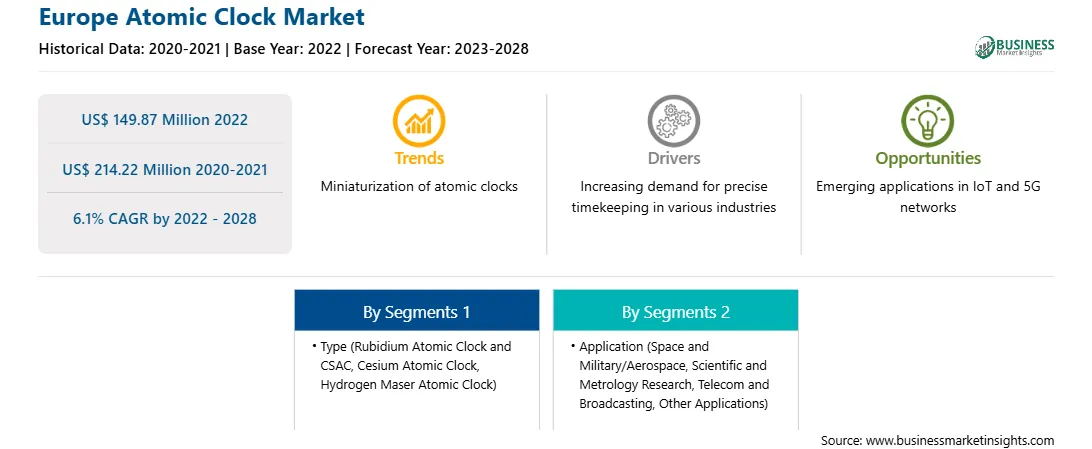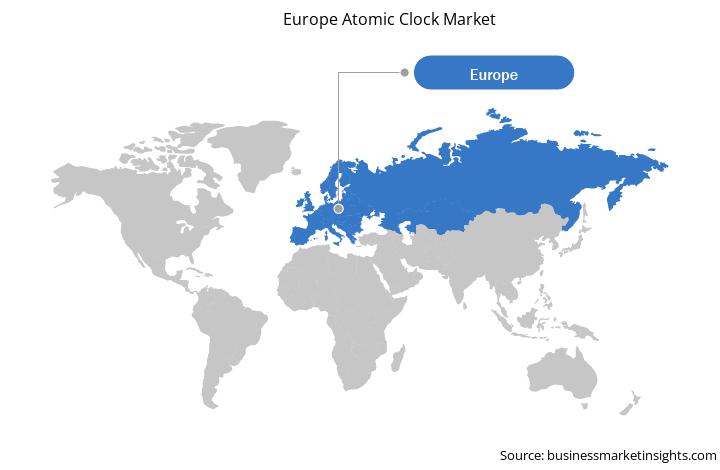Next-Generation Chip-Scale Atomic Clocks (CSACs) is Expected Significant Opportunities for the Europe Atomic Clock Market
At present, most of the applications for communication, navigation, financial transactions, distributed cloud, and defense rely on the accurate timing of atomic clocks or clocks that track time based on the highest degrees of atom oscillation accuracy. New applications and technologies such as 5G networks and GPS alternatives will need accurate timekeeping on portable platforms, which propels the demand for high performance miniaturized atomic clocks. Defense Advanced Research Projects Agency (DARPA) has invested a huge amount in the advancement and miniaturization of atomic clock technology over the past few decades, generating commercially available chip-scale atomic clocks (CSACs) and offering unprecedented timing stability in regards with size, weight, and power (SWaP). However, the physics associated with their designs limit the performance of these first-generation CSACs. For instance, timing errors can be created by calibration requirements and frequency drift, which makes it difficult to achieve the highest degrees of precision and reliability in a portable package. Thus, next-generation chip-scale atomic clock (CSACs)/miniaturization is anticipated to provide growth opportunities to the Europe atomic clock market during the forecast period. In August 2022, scientists in the UK created an eternal engine to keep the next generation of atomic clock operational. The next generation of atomic clock assists in precision timing for global navigation, satellite mapping, and next generations of telecommunication. But atomic clocks are currently massive devices—weighing hundreds of kilograms—which need to be housed within precise, difficult-to-maintain conditions. Precision timing is essential for systems such as global navigation, satellite mapping, and for the next generations of telecommunication. The developments of portable atomic clocks, with a reliable switch to keep them running, compatible electronic optical microchips, and microcombs to miniaturize the atomic clocks is anticipated to provide significant opportunities for the growing adoption of the Next-Generation Chip-Scale Atomic Clocks (CSACs).
Europe Atomic Clock Market Overview
The growth of the European atomic clock market is attributed to the increasing number of projects focusing on atomic clock development. In May 2022, AccuBeat, a leading provider of Rubidium oscillators, Time Servers and GPS disciplined atomic clock was selected to develop and produce an Ultra Stable Oscillator (USO) for the European Space Agency’s (ESA) JUICE (Jupiter Icy Moons Explorer) mission as Space missions and deep space exploration programs rely on high precision atomic clocks. Europe marks the presence of satellite communication solutions providers such as Satcom Global Ltd and Holkirk Communications Ltd. However, the onboard atomic clocks driving satellite-navigation signals on the European Galileo network have noticeably failed, and nine clocks have stopped working on the 18 satellites in orbit. These factors could hinder the growth of the Europe atomic clock market in the coming years.
Europe Atomic Clock Market Revenue and Forecast to 2028 (US$ Million)

Strategic insights for the Europe Atomic Clock provides data-driven analysis of the industry landscape, including current trends, key players, and regional nuances. These insights offer actionable recommendations, enabling readers to differentiate themselves from competitors by identifying untapped segments or developing unique value propositions. Leveraging data analytics, these insights help industry players anticipate the market shifts, whether investors, manufacturers, or other stakeholders. A future-oriented perspective is essential, helping stakeholders anticipate market shifts and position themselves for long-term success in this dynamic region. Ultimately, effective strategic insights empower readers to make informed decisions that drive profitability and achieve their business objectives within the market.

| Report Attribute | Details |
|---|---|
| Market size in 2022 | US$ 149.87 Million |
| Market Size by 2028 | US$ 214.22 Million |
| Global CAGR (2022 - 2028) | 6.1% |
| Historical Data | 2020-2021 |
| Forecast period | 2023-2028 |
| Segments Covered |
By Type
|
| Regions and Countries Covered | Europe
|
| Market leaders and key company profiles |
The geographic scope of the Europe Atomic Clock refers to the specific areas in which a business operates and competes. Understanding local distinctions, such as diverse consumer preferences (e.g., demand for specific plug types or battery backup durations), varying economic conditions, and regulatory environments, is crucial for tailoring strategies to specific markets. Businesses can expand their reach by identifying underserved areas or adapting their offerings to meet local demands. A clear market focus allows for more effective resource allocation, targeted marketing campaigns, and better positioning against local competitors, ultimately driving growth in those targeted areas.

Europe Atomic Clock Market Segmentation
The Europe atomic clock market is segmented into type, application, and country.
Based on type, the Europe atomic clock market is segmented into rubidium atomic clock and CSAC, cesium atomic clock, and hydrogen maser atomic clock. In 2022, the rubidium atomic clock and CSAC segment registered a largest share in the Europe atomic clock market.
Based on application, the Europe atomic clock market is segmented into space and military/aerospace, scientific and metrology research, telecom and broadcasting, and other applications. In 2022, space and military/aerospace segment registered a largest share in the Europe atomic clock market.
Based on country, the Europe atomic clock market is segmented into Germany, France, Italy, the UK, Russia, and the Rest of Europe. In 2022, Russia segment registered a largest share in the Europe atomic clock market.
AccuBeat Ltd; Excelitas Technologies Corp; IQD Frequency Products Ltd; Leonardo SpA; Microchip Technology Inc; Orolia; Oscilloquartz SA; Stanford Research Systems Inc; Tekron International Ltd; and VREMYA-CH JSC are the leading companies operating in the Europe atomic clock market.
The Europe Atomic Clock Market is valued at US$ 149.87 Million in 2022, it is projected to reach US$ 214.22 Million by 2028.
As per our report Europe Atomic Clock Market, the market size is valued at US$ 149.87 Million in 2022, projecting it to reach US$ 214.22 Million by 2028. This translates to a CAGR of approximately 6.1% during the forecast period.
The Europe Atomic Clock Market report typically cover these key segments-
The historic period, base year, and forecast period can vary slightly depending on the specific market research report. However, for the Europe Atomic Clock Market report:
The Europe Atomic Clock Market is populated by several key players, each contributing to its growth and innovation. Some of the major players include:
The Europe Atomic Clock Market report is valuable for diverse stakeholders, including:
Essentially, anyone involved in or considering involvement in the Europe Atomic Clock Market value chain can benefit from the information contained in a comprehensive market report.